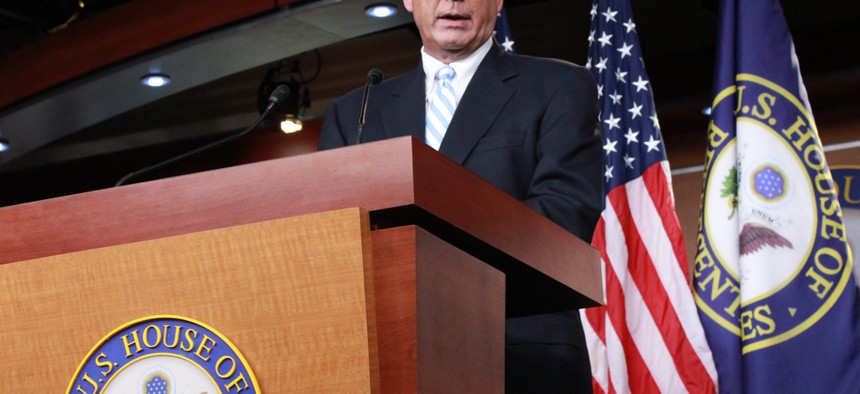
Flickr user talkradionews
House Leaders and White House Closer to a Short-Term Deal on Debt Limit, Shutdown
Senate is looking at longer-term solutions.
As House leadership inched toward brokering a short-term agreement Friday with the White House that would reopen the government and raise the debt ceiling, uncertainty abounded on Capitol Hill due to a raft of alternative proposals that are being conflated by aides and lawmakers alike.
Aides to Speaker John Boehner have been working since Thursday night with the White House to iron out the details of a deal that could be presented to House Republicans as soon as Saturday morning at a special conference meeting. Members began speculating Friday afternoon about an agreement being imminent once House leadership announced there would be no further votes on Friday.
"If there's any sanity left, it will all be over soon," said Rep. Peter King, R-N.Y.
While both chambers are negotiating with the White House, the House appears to be focused on shorter-term solutions. Leadership is asking the White House to establish guidelines for comprehensive fiscal negotiations in exchange for reopening the government and raising the debt ceiling. Lawmakers expect both bills to include provisions that would allow conservatives to save face after swearing never to support a "clean" bill to resolve either crisis.
As described by Republican aides, the debt limit could be extended until Nov. 22 in exchange for some small concession, possibly an entitlement-related reform that Obama has previously voiced support for. The government could be funded through early December, possibly in exchange for a minor Obamacare-related concession such as repealing the medical-device tax. Both extensions would expire with a backstop; the House leaves for a brief Thanksgiving recess on Nov. 21, and enjoys several weeks off beginning Dec. 13.
"Obviously any framework on a larger agreement must include the real drivers of our debt and deficits, including the president's health care law," one Republican leadership aide said.
Yet House Republicans also warned that nothing is finalized, and emphasized that conversations between leadership aides and the White House remain fluid.
"As we have publicly stated, any House vote on a short-term debt-limit bill is contingent on the White House and House Republicans agreeing to negotiations on a larger fiscal framework," said Boehner spokesman Michael Steel. "There is no agreement at this point on what that framework would involve, and we don't plan to comment on the details of these discussions."
On the other side of the Capitol, Senate Republicans, fresh off their meeting with Obama at the White House on Friday afternoon, are thought to be pushing longer-term solutions to both crises.
According to senior GOP aides, some Senate Republicans are offering to fund the government at the $986 billion spending level, while providing flexibility for agencies to reprogram sequester cuts within their budgets. This continuing resolution, which would mandate a repeal of the medical-device tax, would fund the government for anywhere from 12 weeks to a full year.
Sen. Susan Collins of Maine, who first offered a similar plan last Saturday, presented her ideas to Obama on Friday. "He said that it was constructive, but I don't want to give the impression that he endorsed it," Collins said.
Senate Republicans have not articulated a specific set of demands in exchange for a debt-limit increase, but sources say their focus is geared toward accomplishing some combination of entitlement-related policy objectives, which could include means-testing Medicare to raise premiums for wealthier beneficiaries; language on income verification; language defining "full-time" employment; and language that would redefine the size and scope of the Independent Payment Advisory Board. Some of these concessions are also being sought by the House as part of a long-range budget agreement.
Meanwhile, a small clutch of House conservatives—from five to 10 members—are working on a separate solution to the twin crises. This group, reportedly led by Rep. Charles Boustany of Louisiana, is determined to draw an abundance of Obamacare-related concessions in exchange for a long-term funding measure. Their offer to reopen government would start with repealing the medical-device tax. But, according to one member of the group, "that's not enough." On the debt ceiling, this conservative group would propose a shorter extension that would allow time for broader budget negotiations over mandatory spending.
One member of the group, who spoke on condition of anonymity, said their proposal was being "filtered through" levels of House leadership and was not an attempt to undermine Boehner.
NEXT STORY: Grim-Faced Optimism as Fiscal Talks Continue






